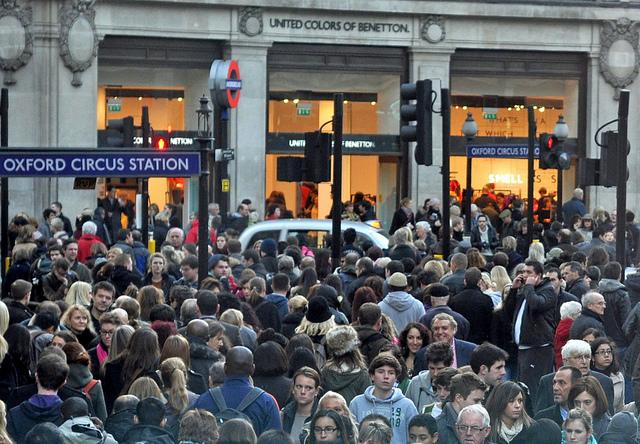Fears of global population boom overblown, some argue
Europe’s busiest shopping street was partially closed on December 3, 2011 due to overcrowding in London. (Photo courtesy of Megan Trace)
The United States has long feared overpopulation, particularly as Baby Boomers began to come of age in the 1960s.
President Lyndon B. Johnson weighed in on the issue during his presidency in 1965, promising to find a solution.
“I will seek new ways to use our knowledge to help deal with the explosion in world population,” President Johnson said.
And President Richard Nixon campaigned on the issue in 1968, saying, “Our cities are going to be choked with people, they’re going to be choked with traffic, they’re gonna be choked with crime.”
While some leaders and academics have expressed concerns about life on Earth at 10 billion people, others say these fears are overblown and that we shouldn’t be panicking. We should be more worried about the population decline that will set in after we reach 10 billion
“It’s not necessarily the people, it’s what the people do,” said Danny Dorling, Halford Mackinder Professor of Geography at the University of Oxford. “The planet couldn’t cope with just one billion people behaving very, very badly.”
Dorling also said that it is important for humans to slow down the consumption of resources like meat, for example, which has more than doubled since 1960. The American people have a surprising opportunity to move the needle toward sustainability by choosing to eat less meat.
“If Americans were to reduce meat consumption by just 20 percent it would be as if we all switched from a standard sedan — a Camry, say — to the ultra-efficient Prius,” according to “Rethinking the Meat-Guzzler,” a 2007 New York Times article.
Moderation is the key, especially as more countries become developed and their populations demand more meat.
“The planet can’t sustain us being stupid, it can’t sustain us being greedy, it can’t sustain us carrying on and doing things that make us unhealthy,” Dorling said. “But the planet can certainly house a population of 10 billion people who spend most of their time not eating meat but eating meat occasionally.”
There are also signs that population growth rate is slowing down after reaching a peak of more than two percent in 1970. More than half of the world’s countries are reproducing at sub-replacement levels, meaning future generations will have smaller populations.
Advancements in the power of women to take more control over their bodies and improved technology like birth control has also contributed to the shrinking population growth rate, Dorling said.
Additionally, a majority of earth’s population live in cities for the first time, making the population growth issue more complex.
“We don’t know how resilient we are to this,” Dorling said. “But what we need to worry about ourselves and how we behave and certainly damaging the planet is not going to help ourselves.”
We want to hear your feedback so we can keep improving our website, theworld.org. Please fill out this quick survey and let us know your thoughts (your answers will be anonymous). Thanks for your time!
